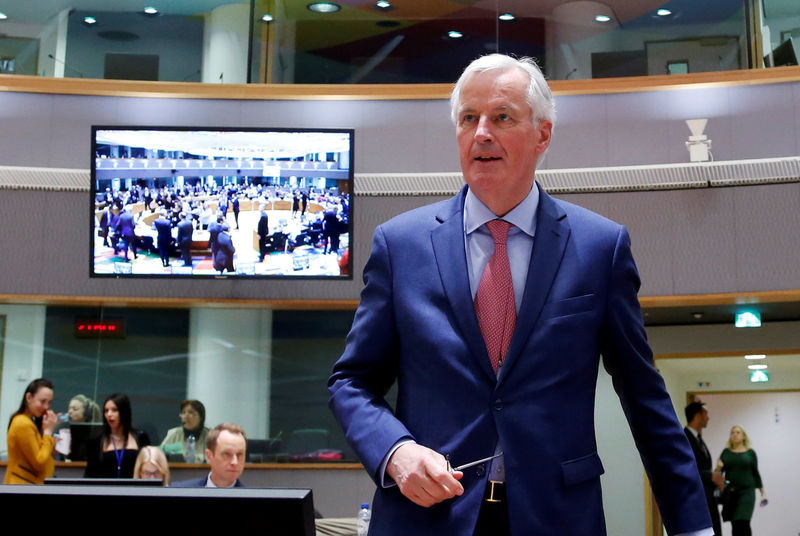By Jan Strupczewski and Alastair Macdonald
BRUSSELS (Reuters) - British and European Union negotiators will spend all next week in talks on Brexit, culminating in their first formal discussion of what their future relationship will look like after Britain has left the EU.
A schedule posted by EU chief negotiator Michel Barnier on Twitter on Friday confirmed he will meet his opposite number, Brexit Secretary David Davis, in London on Monday for the first time since EU leaders gave him instructions to agree a post-Brexit transition to ease Britain's departure.
After interim accords in December on key parts of the divorce terms, EU leaders agreed to launch talks on the transition and the future relationship.
EU officials expect a faster pace to negotiations compared to the roughly monthly rounds of talks lasting 2-3 days each time that was the norm last year. Both sides hope to conclude a deal on a transition in time for EU leaders to endorse it at a Brussels summit on March 22-23.
Though not legally binding unless and until it forms part of an overall withdrawal treaty, leaders hope a transition deal can calm nerves among investors.
Negotiating teams will hold the first technical talks in Brussels from Tuesday to Thursday on what a transition may look like, notably which courts might enforce the treaty and further discussions on avoiding a disruptive "hard" border with Ireland.
On Friday, Barnier and Davis's top officials, Sabine Weyand and Oliver Robbins, will meet in Brussels to wrap up progress made during the week.
The British side will also offer an "update on the future relationship", according to Barnier.
A British official said they would not reveal details of trade proposals; Prime Minister Theresa May has caused some frustration in Brussels by failing to do that so far, although she is expected to lay out her trade ideas in the coming weeks.
Rather, the British official said, Friday's session would focus on areas where London has already declared its preferred outcomes, such as a close relationship in security matters and a "customs partnership".
TRANSITION DEAL
Declared positions on both sides suggest little room for dispute, although May has rejected an EU demand that EU citizens who take up residence in Britain even after Brexit, but before the end of the transition, should enjoy the same lifetime rights which London agreed to grant to those who arrive before Brexit.
That has raised the prospect of delay, but May insisted on Friday that the transition deal would be done within seven weeks -- in time for the March EU summit.
The EU has offered Britain a status quo transition until the end of 2020 after Brexit. But there is disagreement inside May's Conservative Party over the citizens' rights issue and the scope of European Court of Justice jurisdiction during the transition.
Of more concern to some in Brussels is the continued lack of clarity on how Britain sees a free trade deal working.
EU leaders want to be able to agree instructions for their negotiators when they meet on March 22-23 so that trade talks can start in the weeks after that. But once May has revealed her demands it will take the EU some weeks to prepare those plans.
If they cannot meet the deadline of the March summit, the start of trade talks could be pushed back, possibly even beyond the next formal EU summit in late June, jeopardizing hopes of having an outline trade accord ready by the end of the year.
"We still expect to be able to have the trade guidelines for the March summit," one senior EU official said. "But Theresa May is being so discreet. If she doesn't say what she wants, we may not be able to prepare our position in time."
An EU diplomat involved in Brexit talks said: "It’s for them to tell us what they want. If they don't do it in a timely manner, they would be shooting themselves in the foot again."
